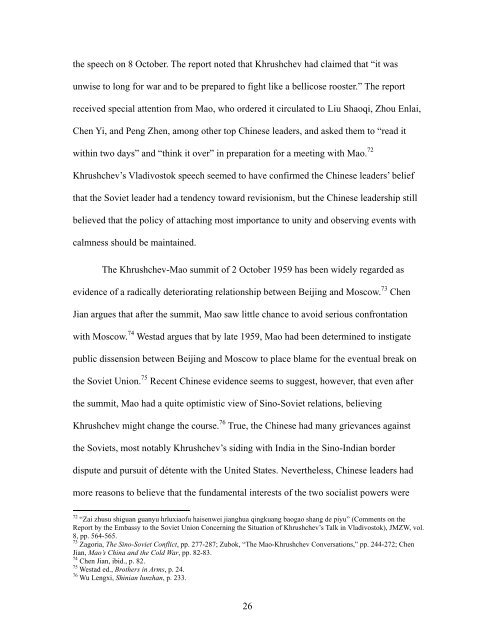The Quarrelling Brothers: New Chinese Archives and a ... - CiteSeerX
The Quarrelling Brothers: New Chinese Archives and a ... - CiteSeerX
The Quarrelling Brothers: New Chinese Archives and a ... - CiteSeerX
- No tags were found...
You also want an ePaper? Increase the reach of your titles
YUMPU automatically turns print PDFs into web optimized ePapers that Google loves.
the speech on 8 October. <strong>The</strong> report noted that Khrushchev had claimed that “it wasunwise to long for war <strong>and</strong> to be prepared to fight like a bellicose rooster.” <strong>The</strong> reportreceived special attention from Mao, who ordered it circulated to Liu Shaoqi, Zhou Enlai,Chen Yi, <strong>and</strong> Peng Zhen, among other top <strong>Chinese</strong> leaders, <strong>and</strong> asked them to “read itwithin two days” <strong>and</strong> “think it over” in preparation for a meeting with Mao. 72Khrushchev’s Vladivostok speech seemed to have confirmed the <strong>Chinese</strong> leaders’ beliefthat the Soviet leader had a tendency toward revisionism, but the <strong>Chinese</strong> leadership stillbelieved that the policy of attaching most importance to unity <strong>and</strong> observing events withcalmness should be maintained.<strong>The</strong> Khrushchev-Mao summit of 2 October 1959 has been widely regarded asevidence of a radically deteriorating relationship between Beijing <strong>and</strong> Moscow. 73 ChenJian argues that after the summit, Mao saw little chance to avoid serious confrontationwith Moscow. 74 Westad argues that by late 1959, Mao had been determined to instigatepublic dissension between Beijing <strong>and</strong> Moscow to place blame for the eventual break onthe Soviet Union. 75 Recent <strong>Chinese</strong> evidence seems to suggest, however, that even afterthe summit, Mao had a quite optimistic view of Sino-Soviet relations, believingKhrushchev might change the course. 76 True, the <strong>Chinese</strong> had many grievances againstthe Soviets, most notably Khrushchev’s siding with India in the Sino-Indian borderdispute <strong>and</strong> pursuit of détente with the United States. Nevertheless, <strong>Chinese</strong> leaders hadmore reasons to believe that the fundamental interests of the two socialist powers were72 “Zai zhusu shiguan guanyu hrluxiaofu haisenwei jianghua qingkuang baogao shang de piyu” (Comments on theReport by the Embassy to the Soviet Union Concerning the Situation of Khrushchev’s Talk in Vladivostok), JMZW, vol.8, pp. 564-565.73 Zagoria, <strong>The</strong> Sino-Soviet Conflict, pp. 277-287; Zubok, “<strong>The</strong> Mao-Khrushchev Conversations,” pp. 244-272; ChenJian, Mao’s China <strong>and</strong> the Cold War, pp. 82-83.74 Chen Jian, ibid., p. 82.75 Westad ed., <strong>Brothers</strong> in Arms, p. 24.76 Wu Lengxi, Shinian lunzhan, p. 233.26
















